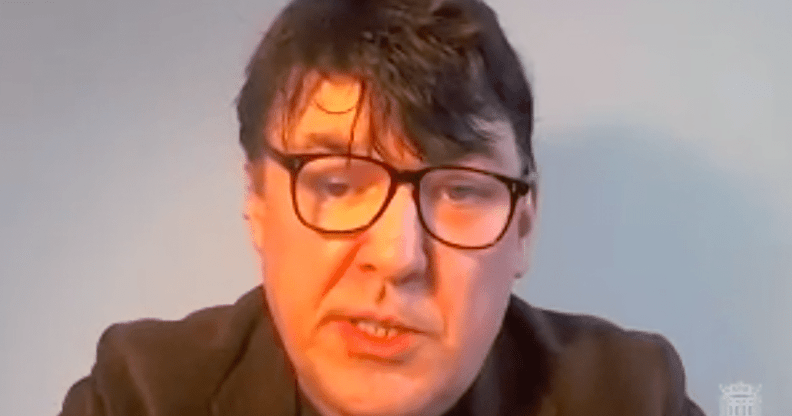Graham Linehan accused of using House of Lords as ‘court of appeal’ to overturn his Twitter ban

Graham Linehan speaks to the House of Lords’ Communications and Digital Committee (Parliament Live)
Graham Linehan was accused of using the House of Lords as a “court of appeal” to overturn his Twitter ban during a discussion on freedom of expression online.
The disgraced comedy writer was invited to speak with the Communications and Digital Committee on Tuesday (9 March) regarding social media conduct policies.
Linehan, who was hit with a permanent Twitter ban last year for “hateful conduct”, was repeatedly reined in by peers as he derailed the discussion with “gender critical” issues.
After pressing to read from a statement he had prepared, Linehan was allowed to speak unbroken for seven minutes on topics ranging from JK Rowling, puberty blockers, his financial problems and his failed marriage.
“If you believe that JK Rowling is transphobic… then you are under a spell,” he said. “If you believe that men can fairly compete against women in their sports, including contact sports, then you are under a spell.
“If you believe men will not go to the most extreme lengths to gain access to women and children, then you are under a spell. If you believe that children as young as three can agree to a procedure that puts them on a medical pathway for life [and] arrests their natural puberty … then you are under a spell.”
While young children are often well aware of their gender identity, there is no way for three-year-olds to access trans healthcare, let alone puberty-blocking drugs. All experts advise at this age is to affirm the child’s gender, for example through a haircut or clothing.
“With respect, this is an inquiry into freedom of expression online, and that’s what I now want to return to,” replied Lord Gilbert of Panteg, the committee’s chair.
“We’re not here as a court of appeal to review any decisions that have been made by tech companies. We are here to think about how public policy in this area may develop. We’re not speaker’s corner, you’ve made your point.”
Graham Linehan was joined by Helen Staniland, a software developer and prominent anti-trans figure who was also kicked off Twitter for violating conduct policies.
“I am banned from the public square for the rest of my life,” she told the panel as she called for greater transparency regarding Twitter’s moderation.
She and Linehan suggested the platform should disclose “data” on individuals who report tweets and establish a clear appeals process with an independent adjudication panel, the members of which would also be disclosed.
When asked about the Law Commission’s consultation on criminalising posts which are likely to cause “emotional or psychological harm”, Staniland expressed concern it could be used “as a tool for the powerful to silence the weak” – but conceded that an expert psychologist’s definition on the matter would be “an excellent start”.
Linehan, however, veered off once more to discuss “biological facts” and sex-based rights. He was again asked to return to the topic at hand.
“My show The IT Crowd was banned from Channel 4 because the current generation coming up is extremely censorious, very, very sensitive and simply can’t deal with certain jokes or principles or ideas,” he replied.
“So just because those generations have that doesn’t mean it should be imposed on the rest of us.”
Graham Linehan’s focus remained on his Twitter ban even as Lord Colville attempted to change the subject to Facebook.
The peer repeatedly directed him to describe the specific processes regarding a post being removed, but he appeared disinclined to speak about the platform, saying: “I don’t really care about Facebook so I never appeal.”
When Lord Colville highlighted the transparency in Facebook’s content moderation and appeal policies, which are led by a 20-member oversight board, Graham Linehan again responded by talking about his offensive tweets.
“What I’m interested in is the way the tech platforms are actually responding to that, because after all our report is going to have to look at that,” Lord Colville said.
“That so many platforms should come to the same conclusion [about you] is extraordinary if you have done nothing to harass anyone,” the peer noted at one point.

